Lea Wait's Blog, page 45
February 14, 2024
A New Experiment: POD Omnibus Editions
 Kaitlyn Dunnett/Kathy Lynn Emerson here, wishing you a Happy-Day-After-Valentine’s Day by announcing a sort-of-new book and the story behind it. The Maine Quartet is the fourth and final collection of romance novels I wrote between 1989 and 1997. I had two reasons for creating these omnibus e-book editions. One was to introduce readers to a part of my backlist that they may not know about. The other was to give myself a chance to go back and edit what I wrote a quarter of a century ago. I’m a much better writer now, and no longer have to deal with editorial interference. I didn’t change any of the story lines or characters, but I was able to make the text read more smoothly, get rid of the occasional descent into purple prose, and eliminate one or two places where my heroes expressed sentiments that went unchallenged in the 1990s but struck me as offensive in the 2020s. That said, the books are still set in the year they were first published, which means some readers may consider them to be “historical” novels (ouch!).
Kaitlyn Dunnett/Kathy Lynn Emerson here, wishing you a Happy-Day-After-Valentine’s Day by announcing a sort-of-new book and the story behind it. The Maine Quartet is the fourth and final collection of romance novels I wrote between 1989 and 1997. I had two reasons for creating these omnibus e-book editions. One was to introduce readers to a part of my backlist that they may not know about. The other was to give myself a chance to go back and edit what I wrote a quarter of a century ago. I’m a much better writer now, and no longer have to deal with editorial interference. I didn’t change any of the story lines or characters, but I was able to make the text read more smoothly, get rid of the occasional descent into purple prose, and eliminate one or two places where my heroes expressed sentiments that went unchallenged in the 1990s but struck me as offensive in the 2020s. That said, the books are still set in the year they were first published, which means some readers may consider them to be “historical” novels (ouch!).
I must confess a dark secret—I’ve always loved revising. When I was writing romance, producing three or more full-length contemporary category romance novels a year, I didn’t have time to do as much of that as I like. Going back and making them better has been both a challenge and a pleasure.
The four novels in this collection, all originally published between 1989 and 1997, have the common bond of their setting—the rural central Maine mountains already familiar to readers of my Liss MacCrimmon Mysteries.

Cloud Castles was originally published in the Silhouette Intimate Moments line under the pseudonym Kaitlyn Gorton. It is romantic suspense rather than straight romance. It begins when fate brings an optimistic Kendra Jennings and a cynical Alex Moreau together on a lonely country road in 1989. A deputy sheriff, Alex thinks Kendra is keeping secrets and he’s right, but she’s telling the truth about the peculiar things that happen to her after she inherits a house deep in the Maine woods. Those events are entangled with the activities of Alex’s rebellious teenaged son and end up putting both Kendra and the boy in mortal danger.
In Love Thy Neighbor, originally published in Bantam’s Loveswept line, Linnea Bryan returns to Maine to discover her roots and encounters the unexpected in her next-door neighbor, Marshall Austin, a retired cop who now raises and races sled dogs. When she decides to stay in Austin’s Crossing to renovate her late grandfather’s house, Marsh is suspicious of her motives. Family plays as great a role as romance in this one. Marsh is the sole support of his aunt and his half sister but has an old grudge against Linnea’s mother, the woman who, years before, broke up his parents’ marriage.
In The Rapunzel Trap, formerly published as Hearth, Home and Hope under the pseudonym Kaitlyn Gorton for Silhouette Special Editions, Hope Rowan suspects that the fairy tale character Rapunzel had agoraphobia, just as she does. Is Cooper Sanford, former high school bad boy, the handsome prince who can rescue her from her tower? To persuade Hope to help him with his motherless daughter, he’s willing to give it a try, but first they each have to overcome the scars left by earlier marriages.
And finally, in Family Lies, formerly published as Separated Sisters under the pseudonym Kaitlyn Gorton, again for Silhouette Special Editions, Ariadne Palmer, part owner of an antiquarian bookshop in Maine, doesn’t believe Clay Franklin when he tells her she has a twin sister and grandparents she never knew about. As her grandfather’s lawyer, Clay has sworn not to tell her the whole truth about her family, but his immediate and growing attraction to her argues against keeping that promise.
As a bonus, this collection also includes “The Boston Post Cane,” a short story in the mystery genre which had its origins in Family Lies.
Although this isn’t the first time I’ve self-published an e-book collection (In addition to the romances collections, I’ve also done them for my two historical mystery series), this is my first attempt to produce a print-on-demand edition at the same time. Fortunately, revising The Maine Quartet meant the manuscript ended up being quite a bit shorter than it started out. I did much more cutting than I expected to, especially on Cloud Castles.
I use Draft2Digital for self-publishing. They have a maximum length of 740 pages for a trade paperback. This book came in at 812 pages at 5½”x8½” but when I switched to the 6″x9″ size it came in at 692 pages. That’s a big paperback, but since this is an experiment, I moved on to the next step—pricing. Draft2Digital’s suggested price was $34.99, which would mean I’d receive $5.35 for each copy sold. Since I couldn’t imagine anyone paying that much, I looked for a price point that would be more reasonable. Keep in mind that the author share of a traditionally published paperback is usually 8% of the retail price. That would be $2.80 for a $34.99 book. With that in mind, and also keeping in mind that it wouldn’t cost me anything to make a print version available, I started playing with the price. At $28.99, I’d get $2.62 per book. At $26.99 it would be $1.72. At $25.99 it came in at $1.27, and at $24.99 my share would be down to eighty-two cents. I opted for $25.99, which still seems very expensive to me, but I would like to see a little income from this project! The e-book, which I expect will be the preferred way for most people to read the collection, is priced at $8.99. I receive $5.35 for each copy sold and various amounts for rentals and/or library usage.

I haven’t seen the print version yet, although I’ve ordered a few copies for myself at $10.43 apiece. I want to make sure the physical book is sturdy enough at that size to make it worth the price. If it seems likely to fall apart, I’ll take if off the market. If it passes inspection and it turns out that readers actually want to buy it, I’ll make the other omnibus editions available in print format as well, as long as they come in under the page limit.
So what do you think, MCW blog readers? Would you pay that much for a trade paperback? Do you even read print editions anymore? And will you take a chance on the romance/romantic suspense genre if the stories are set in Maine, even though your first love is mysteries?

In case you are in the mood to buy, there are links below to some of the places where The Maine Quartet is available. You can also find it at Kobo, Smashwords, and other e-book outlets, and libraries should be able to order either format for you to borrow.
Apple iBook and other outlets:
https://books2read.com/u/bPDR0z
Amazon Kindle:
https://www.amazon.com/dp/B0CV1CL4WH
Nook:
https://www.barnesandnoble.com/w/the-maine-quartet-kathy-lynn-emerson/1144776764?ean=2940179759782
B&N print edition:
https://www.barnesandnoble.com/w/the-maine-quartet-kathy-lynn-emerson/1144776764?ean=9798224198184

Kathy Lynn Emerson/Kaitlyn Dunnett has had sixty-four books traditionally published and has self published others. She won the Agatha Award and was an Anthony and Macavity finalist for best mystery nonfiction of 2008 for How to Write Killer Historical Mysteries and was an Agatha Award finalist in 2015 in the best mystery short story category. In 2023 she won the Lea Wait Award for “excellence and achievement” from the Maine Writers and Publishers Alliance. She was the Malice Domestic Guest of Honor in 2014. She is currently working on creating new omnibus e-book editions of her backlist titles. Her website is www.KathyLynnEmerson.com.
February 13, 2024
Are We There Yet?
I’ve spent the last few years finishing two books. They took forever to write. And by forever, I mean I avoided them as much as possible, consequently stretching out their completion. I just wasn’t feeling “writerly.” Not blocked, mind you, oh no. Can’t admit to that. But I will admit to discouraged. Publishing can be a rather pernicious enterprise, and it’s easy to feel adrift.
When I did feel the muse’s tentative tap on my shoulder, I was lured away by a bright shiny new thing. Then I felt guilty, and didn’t work especially hard on anything except my garden.
I’ve always had pretty good reviews, but I read somewhere the “average” writer makes less than $5000 a year. Thankfully, I can top that comfortably, though I’d never be able to support myself comfortably, LOL. But I’ve never been in it for the money anyway, which is a good thing because now I have to spend some.
This year I’m finally going to get those finished books “out there,” which means some expense for cover design and formatting. And although the books have been edited, I am going through them for the umpteenth time and have discovered they have not been edited enough.
When will it be enough? Hard to say. It seems I am an inveterate tinkerer, never content to leave good enough—or average enough—alone. I’m not talking about typos and punctuation, but content. This is why I don’t read my books after they’ve been published. I always want to change a phrase or add a scene I didn’t think of, or even, Heaven forfend, strike out entire purposeless paragraphs.
Apparently, I do not know when to stop. I’m not sure what this says about my character—perfectionism? Perseverance? Persistence? Those words sound rather grand, but it’s more like me beating a dead horse. I don’t want to kill the life out of these books by being overly fussy. But as an example, I just looked up synonyms for fussy.
Obsessive might work.
So, wish me and the barely-alive pony luck. I’ll keep you posted when Lady May makes her long-delayed debut!

How do you know The End is really The End? As a reader, do you ever want to “fix” a book? Do mistakes drive you crazy? I get bothered if words repeat too close together.
February 9, 2024
Weekend Update: February 10-11, 2024
 Next week at Maine Crime Writers there will be posts by Vaughn Hardacker (Monday), Maggie Robinson (Tuesday), Kaitlyn Dunnett/Kathy Lynn Emerson (Thursday) and Kate Flora (Friday).
Next week at Maine Crime Writers there will be posts by Vaughn Hardacker (Monday), Maggie Robinson (Tuesday), Kaitlyn Dunnett/Kathy Lynn Emerson (Thursday) and Kate Flora (Friday).
In the news department, here’s what’s happening with some of us who blog regularly at Maine Crime Writers:
Kate Flora: With Valentine’s Day on the horizon, I can’t resist reminding everyone about my romantic suspense Wedding Bell Ruse.

An invitation to readers of this blog: Do you have news relating to Maine, Crime, or Writing? We’d love to hear from you. Just comment below to share.
And a reminder: If your library, school, or organization is looking for a speaker, we are often available to talk about the writing process, research, where we get our ideas, and other mysteries of the business, along with the very popular “Making a Mystery” with audience participation, and “Casting Call: How We Staff Our Mysteries.” We also do programs on Zoom. Contact Kate Flora
TWO BITS OF ADVICE THAT FLOATED MY WAY THIS WEEK
Jule Selbo
A few days I attended a ZOOM event (set up through Thriller Fest) – it was an interview with the prolific Dean Koontz.
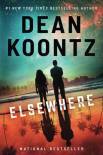

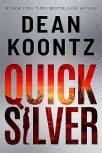
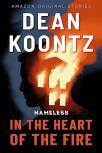
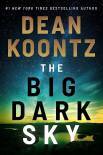 and 100 more**
and 100 more**
The hour went by quickly – and he had lots of tips for writers.
One that I stood out: Get a good office chair.
Koontz shared that he gets up at 5 am, walks his dog, has a quick bite to eat and then settles into his office chair and stays there. No lunch. No errands. No interruptions. He writes until dinner time. (Could that really be, I asked myself. Can one be that protected, every day, from “stuff that needs to be done”?) He credited this disciplined schedule to the happy fact that he averages a completed book every six months – so far the total is around 105 novels (add to that some short stories and novellas).

He also gave some of the credit to his Herman Miller chair. “You gotta have a good chair,” he said. I remember looking over at my office chair – a swivel, faux leather, armless ugly thing that has befriended my behind but doesn’t contribute much to me wanting to sit on it (non-stop) for ten to twelve hours.




(Above: just some other chair options I have seen at friends’ homes, what does yours look like?)

Herman Miller office chairs are pricey. But the designers seem to care about those sitting behind a desk. You can go on their office chair site and take a “Find Your Chair” Quiz. You share how long your workday is, if someone else shares the use of the chair, posture preferences, height, weight, desire for adjustability and back support and ventilation.
 I took the quiz. The chair that would keep my butt, back and mind happy costs just under $2,000.
I took the quiz. The chair that would keep my butt, back and mind happy costs just under $2,000.
Attending the Koontz interview was good for my dark-February psyche. He had a lot of interesting things to say about building characters – good guys and bad guys. How he sometimes blends horror, sci-fi, fantasy and humor into his mystery-crime books and why. How he works with and relies on his editor (and it seems to be a good, healthy professional relationship – very supportive and creative.)
But what about that interview comes to the forefront in my mind over and over? That Herman Miller chair. I imagine it at my desk, tall, proud, mysterious in its ability to hold me in place, and expensive. Will it ever be a reality?
Could it change my world as I know it?
Another tidbit that floated across my existence that could be life-changing:
This morning, on my usual five-minute drive to the local coffeeshop at 5 AM, I was looking forward to my snippet of “whatever is on NPR” at the moment. I was gifted with a short dive into a piece on Russian Elie (Ilya) Metchnikoff (1845 – 1916), the founder of gerontology. A successful immunologist, he had a large working space at the Pasteur Labs in France – where he declared that aging was a disease, and he was – dang it all – going to cure it.
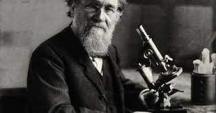
Well, that caught my attention. I almost sat in my car in front of the coffeeshop so I could listen to the end of the podcast, but my desire to finish Chapter 15 in the next Dee Rommel Mystery book took precedence. I knew I could find the podcast later and there was no need to fight my Catholic schoolgirl discipline.
But what I did hear: A very young Metchnikoff lost his first wife to tuberculosis, nearly lost his second wife to typhoid fever. He became fascinated with germs, bacteria (are germs bacteria?) microbes (maybe germs and all bacteria are microbes?). One of his big discoveries was the presence of ‘phagocytes’ – bacteria-eating cells that could fight infection. He won the Nobel Prize for that work.

So not a ‘quack’. Maybe he had his big idea about curing aging while sitting in this chair. He became obsessed with figuring out how humans could live 150 healthy years and then – when we were just sick of the whole thing – we could opt to die. Nice and neat.
One of his answers to longevity? Yogurt.
He had heard of some farms in the mountains of Bulgaria where inhabitants were centenarians. They ate a lot of yogurts – and since Metchnikoff believed that the large intestine, where imbibed foodstuffs were held and broken down – was largely responsible for unwanted events in human health (which lead to aging and death) . Metchnikoff did some experiments and came to believe yogurt affects bacterial action in the intestines in a positive way. I know, I know – all that probiotics stuff.
Not that I hadn’t heard of this.
We are inundated with information on pro, pre and antibiotics, micro and macrobes, kefirs (just don’t add honey or maple syrup) but when listening to the podcast on Metchnikoff, I realized (for the umpteenth time) that unless a “fun” story is attached to healthy advice (or any advice) things can go in one of my ears and out the other quite quickly. What was the “fun” story that drew me into Metchnikoff’s championing of yogurt?

When he would go out for dinner in Paris, he would bring a Bunsen burner with him and sterilize the restaurant-provided knives and forks on the table before using them… Just one of the little things one can do to go to war with a pesky germ that may be lying in wait.
So. Eat more yogurt. Save up for a Herman Miller chair. With just these two changes in my life, will I finish a riveting, satisfying, exciting and fun book every six months?
February 8, 2024
Food Critic vs Book Reviewer

I just finished Ruth Reichl’s fantastic book, Garlic and Sapphires: The Secret Life of a Critic in Disguise, and it made me think about critics in general. We, as writers, must suffer the slings and arrows of all the book reviewers out there. And like a negative restaurant write-up, bad reviews can quickly sink a book. And since we have so many fine dining establishments here in Portland, Maine, I thought it would be an appropriate topic for this blog.
What I like about Reichl is that she took her job seriously. She understood the considerable responsibility of leaving a bad review, which is why she visited an establishment many times before deciding on how many stars to give a particular restaurant. The ramifications of her critique had the potential to put the place out of business, as well as put many people out off a job.
As part of her responsibilities, Reichl used different disguises to hide her identity. Many of the top NY restaurants would hire spotters to see if and when she came in. Or else they would reward employees with a bonus of five hundred dollars in cash if they spotted her. There were outings when she was recognized, but many of the times she dined out she was able to fool the staff. Concealing her identity made a huge difference in the type of experience she would have. Unrecognized, the service and food was on occasion subpar or unremarkable. Recognized, her meals were luxuriously presented, executed perfectly, and brought out in a timely fashion. The service was top notch and attentive. For one restaurant, she debated writing two separate reviews for the two vastly different culinary experiences she had.
Of course, when she liked a restaurant, she raved about it. And when she raved about it, it meant that the place would be booked up for months out. This was the upside of a great review: popularity, fame, and money. Lots of money. And Reichl is a great writer. Here is an example one of her reviews.
Chilled lobster consommé is a tour de force. The soup is as clear as crystal but so expressive of lobster that if you close your eyes and take a bite, you are surprised to find your mouth filled with liquid. The soup, decorated with rounds of lobster topped with crème fraîche and caviar, is dotted with coral cream when it is served. This is an astonishing dish worthy of a temple of haute cuisine.
Ultimately, the pressure of writing restaurant reviews got to her, as it does with all food reviewers. It’s simply too much responsibility, and such a heavy burden for one individual to carry. And the food reviewer frequently reviewed by many of the readers of the NY Times. Not to mention, she found it nearly impossible to enter a restaurant and not be recognized; she’d used up all her disguises.
How do you handle reviews? I’ve gotten better dealing with them as time goes on, but I admit that it’s still is hard to read a bad review of my book. Unlike restaurants, we authors don’t have millions of dollars in capital to lose. Nor do we have to worry about the livelihood of dozens of staff in our employ. How about all of you who review books? Are you able to critique freely and honestly? As a writer, I’m absolutely unable to give a bad review to a book that I dislike. Being a writer, I know how much it pains me. I’d rather leave no review than a bad one.
That’s it for now. Let me know how you feel about reviewing and being reviewed. And go out and enjoy your favorite restaurant this weekend.
Take care!
Joe
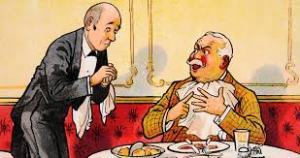
February 6, 2024
I Came, I Saw, I Wrote

John Clark checking in after having survived January, albeit barely. Unlike Florida, or Southern California (although that’s changing pretty quickly thanks to that fake-news climate stuff), we have distinctive seasons, even, at times, distinctive months. That is one of many reasons why I delight in writing about Maine. My essays in the no longer published Wolf Moon Journal were labors of love. My Right Minded, But Left of Center column in a now defunct Somerset County newspaper was equally fun to write. Granted, it cost the Hartland Public Library a few patrons, given its leftist leaning, but it also had a strong group of regular readers.
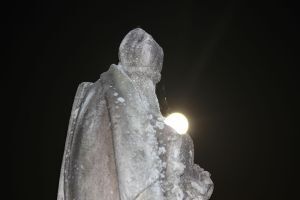
There are many reasons why Maine is so satisfying for a writer. I never cease to amaze myself with how many mental images I can dredge from my memory. Some recall events, some bring back sights, others pull real Maine characters from long ago. While every state has interesting people, I happen to believe more of them live here and if you’re respectful and a good listener, they are more than happy to share yarns and life experiences with you.

I call such memories, as well as current conversations with Mainers, a form of literary mining, somewhat akin to other forms of nontraditional mining. Consider, for example my penchant for ditch mining (picking up returnables from roadsides), coin mining (competing with my wife to find dropped coins), or a more recent one-lottery ticket mining. This one is turning out to be a lot of fun. Non-winning tickets have codes that can be entered online and accumulate points that can be redeemed for cool stuff. When I was the Hartland librarian, I accumulated enough points to give four chromebooks to the fourth grade class. They were all sharing two laptops at the time. Currently, I’m getting Amazon gift cards, getting books that no Maine library has, and after reading them, donating them to the Waterville Public Library.

This ‘do more with less’ mentality runs strong through rural Maine. I incorporate it, along with composites of people I know or remember, when creating interesting characters in stories. I’m wrapping up two short stories right now, one based on long ago family history, the other a horror tale with a main character modeled on someone I worked with 50+ years ago when I raked blueberries.

One other benefit of living in Maine is the size and geographic diversity. I’ve had the good fortune, whether for work or on family trips, to see most of rural Maine. That has allowed me to create fictional towns with features seen in the past, whether they be hills, valleys, waterways, or abandoned houses. It’s easy to pass by an empty home on a regular basis and start imagining how it came to be that way. Sometimes, I get the real story from folks who live nearby. It might be that the owner had no kin, sometimes the property is in a bitter tug-of-war between heirs who dislike and distrust each other.
I like old railroad beds for much the same reason. Imagining how it might have looked when an old steam locomotive passed by awestruck kids comes to mind often, as does my father’s reminiscences of great aunt Kate Burke. She owned the hardware store in Bingham and in the day, was able to travel to Boston on buying trips and return in comfort all the way home by rail.

Memories, imagination, conversations with interesting folks, driving on unexplored roads. These are some of the ways I come up with new stories. What are yours?
February 4, 2024
January’s Storms
If January taught us anything, it’s that the power of an ocean storm during a record-setting high tide is not to be denied, especially when a southeast wind gets behind it.
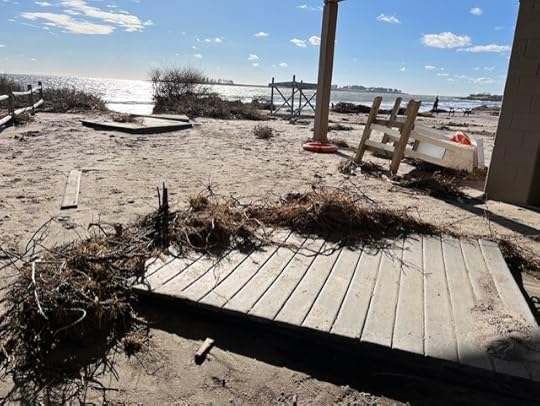
Walkways, lifeguard chairs and other detritus scattered by the surf well above the usual high tide line at Crescent Beach in Cape Elizabeth on January 14, the day after the second coastal storm.
The surging surf heaved huge rocks into dooryards of homes on Peaks Island’s back shore and destroyed stretches of the asphalt roadway. Historic, unoccupied fish houses washed off the rocks at Willard Beach in South Portland, and working shacks full of gear wound up floating in harbors along the Midcoast.
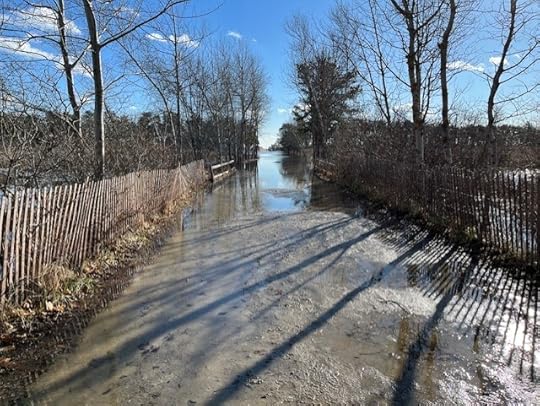
The path to Scarborough Beach was impassable on January 14, flooded by the marsh ponds following two massive storms.
Multiple harbors Downeast took a direct hit, including the state’s largest lobster port of Stonington, where the sea damaged commercial wharves, tossing heavy-duty deck boards about as though they were pickup sticks.
As has been reported widely, beaches across southern Maine were decimated, including the ones that we visit on our #SundayBeachWalks.
Weeks later, they’re still covered by tons of rock that replaced sand the sea scoured away.

The dunes at Scarborough Beach were inundated by the churning surf, resulting in the face of the dune being at least 20 feet back from where it was in December. Remnants of the decimated vegetation are visible in this photo,
In Scarborough and Cape Elizabeth, well-established dunes were muscled aside by storm surges. Their ocean-facing edges were forced to retreat by relentless waves that ripped beach grass out by the roots. The damage will impact the birds and many other species that thrive in fragile coastal habitats.

An area of dune grass at Crescent Beach that managed to hang on. The shore was strewn with clumps this size that were wrenched out by their roots.
If, like us, you want to be part of the addressing the impact of these recent storms in particular, and the effects of climate change along the Maine coast in general, please consider supporting the Island Institute.
On its website, https://www.islandinstitute.org/ there’s a plethora of information about the steps being taken to build more resilient infrastructure in Maine’s coastal communities. The Institute also is taking donations, if you’re so inclined, to support the many hard-hit communities critical to the health of Maine’s coastal economy.
As a writer I admire often says, we’re in this together.
Brenda Buchanan sets her novels in and around Portland. Her three-book Joe Gale series features a contemporary newspaper reporter with old-school style who covers the courts and crime beat at the fictional Portland Daily Chronicle. An attorney since 1990, Brenda currently is writing a series about a criminal defense lawyer who takes on cases others won’t touch in the hometown to which she swore she’d never return. Brenda’s short story, “Means, Motive, and Opportunity,” was in the anthology Bloodroot: Best New England Crime Stories 2021 and received an honorable mention in Best American Mystery and Suspense 2022. Her story Assumptions Can Get You Killed appears in Wolfsbane: Best New England Crime Stories 2023.
February 2, 2024
Weekend Update: February 3-4, 2024
 Next week at Maine Crime Writers there will be posts by Brenda Buchanan (Monday), John Clark (Tuesday), Joe Souza (Thursday) and Jule Selbo (Friday).
Next week at Maine Crime Writers there will be posts by Brenda Buchanan (Monday), John Clark (Tuesday), Joe Souza (Thursday) and Jule Selbo (Friday).
In the news department, here’s what’s happening with some of us who blog regularly at Maine Crime Writers:
Maine Crime Writers Dick Cass, Maureen Milliken and Jules Selbo will be at the South Portland Public Library, 2 p.m. Saturday (Feb. 3), for a Make Your Own Mystery event. If you’ve never attended one, check it out. The audience helps prompt characters, plot, setting and more, and the three mystery authors make a story out of it. It’s a lot of fun, often funny, and a great way to spend an hour on a winter afternoon. Barbara J. Kelly will also be selling our books. The library is at 482 Broadway in South Portland.
An invitation to readers of this blog: Do you have news relating to Maine, Crime, or Writing? We’d love to hear from you. Just comment below to share.
And a reminder: If your library, school, or organization is looking for a speaker, we are often available to talk about the writing process, research, where we get our ideas, and other mysteries of the business, along with the very popular “Making a Mystery” with audience participation, and “Casting Call: How We Staff Our Mysteries.” We also do programs on Zoom. Contact Kate Flora
The Best Made Plans
Kate Flora: I had a lot of plans for how much I’d accomplish this week. Finish tweaking that police procedural/serial killer book to enter in a contest. Review my other dark police procedural and decide whether to submit it. Get out the editor’s comments on the Dog book and start revising. Create a new graphic to promote my romantic suspense, Wedding Bell Ruse.
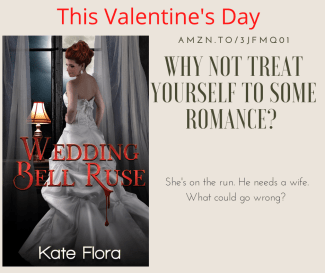 Then there were the administrative tasks. Finish organizing the “Writing Cops Right” panel for Sisters in Crime. Put together the agenda for the February meeting. Get tax materials together for the accountant. Make a million phone calls to locate a prescription drug that’s out of stock nearly everywhere. Call an exterminator to get these darned mice out of my house.
Then there were the administrative tasks. Finish organizing the “Writing Cops Right” panel for Sisters in Crime. Put together the agenda for the February meeting. Get tax materials together for the accountant. Make a million phone calls to locate a prescription drug that’s out of stock nearly everywhere. Call an exterminator to get these darned mice out of my house.
The list goes on and on.
There’s the research I need to do so I can I finally rewrite a new Thea Kozak mystery, as my fan letters keep asking me to do. Riding to tai chi, my friend Margaret gives me an idea. Now it must be worked into a plot.
Then there were all the things that needed to be packed and toted to the post office to mail. The clothes I never wear to go to the consignment shop. Try on that new bathing suit and see if it will work for a Florida vacation. Seriously, can anyone try on a bathing suit in February and not be horrified?
Go to my tai chi class. Work out with my trainer. Walk my thrice a week four miles.
[image error]Pexels.com" data-medium-file="https://i0.wp.com/mainecrimewriters.c..." data-large-file="https://i0.wp.com/mainecrimewriters.c..." class=" wp-image-32726" src="https://i0.wp.com/mainecrimewriters.c..." alt="" width="288" height="175" data-recalc-dims="1" />Photo by Pixabay on Pexels.com
Well. I was on a roll. I got the manuscript off to the contest. I went to tai chi. I wrote several chapters in the book I turn to whenever I stuck in my “real” work. And then the phone call came saying: Oh yes, that bump on your leg that you thought didn’t look quite right. The one your dermatologist didn’t think was a problem? Well guess what. It’s a skin cancer. Not the worst one. Not the best one. The middle one that still has to be taken seriously.
So my work day became holding on the phone, trying to make an appointment for the surgery to have it removed. I got lucky and found the person who wasn’t dismissive and wanted to schedule it for April sometime. And miracle of miracles…got an appointment to be sliced and diced this morning.
For a while, at least, I don’t have to worry about running errands. My leg is wrapped in an enormous bandaged and I’m supposed to stay off my feet. No trainer. No long walks. So, since writers are also supposed to be avid readers, I’ve got a few days off to lie about and read. Northeaster by Cathie Pelletier. The new biography of Joshua Chamberlain. Foster by Claire Keegan. All the reading I’d planned to do between Christmas and New Year’s which got derailed.
So, when I’ve finished them, dear readers, what books should I read next?
January 31, 2024
A Tribute to Phyllis A. Whitney
Kaitlyn Dunnett/Kathy Lynn Emerson here. Back in the 1970s, when I was first starting out and trying to write mysteries for middle-grades readers (ages 8-12), Phyllis A. Whitney’s Writing Juvenile Stories and Novels was one of the go-to how-to books on the subject, along with Joan Lowry Nixon’s Writing Mysteries for Young People and Jane Yolen’s Writing Books For Children. A little later, branching out into romantic suspense, I added Whitney’s Guide to Fiction Writing to my shelf of writing books. And, of course, I’d been reading Whitney’s romantic suspense novels for years. Between 1943 and 1997, thirty-nine of them were published, along with twenty juvenile mysteries between 1949 and 1977 and fourteen novels for young people between 1941 and 1972.
I won’t say I took all her advice. For one thing, she was a plotter, advising wannabe writers to make extremely detailed outlines before starting to write each book. That never worked for me, although I did give it a try. What she did do was inspire me to think I could write in more than one genre, mix up the genres a bit, and have a long writing career. She died in 2008 at the age of 104. In 2024, a great many of her titles are still readily available in electronic, audiobook, large print, hardback, and paperback formats. That’s one heck of a legacy!
I never met Ms. Whitney in person, but I do have a lovely note from her in response to my request for a blurb for one of my children’s books. She declined, since she was no longer writing for that age group, but offered words of encouragement that I cherish. She and I, and the then fledgling Sisters in Crime, also had something in common—a desire to advance the careers of women mystery writers. Later, when a small group at Malice Domestic founded the now inactive American Crime Writers’ League, she was an avid supporter.

It was while going through one of my scrapbooks that I recently found a copy of the ACWL newsletter, the BULLETin, in which was printed a letter Ms. Whitney had written to another prominent member, the late Margaret Maron, someone I did have the good fortune to spend time with on numerous occasions. Since she gave permission for Margaret to share it, I feel comfortable doing the same.
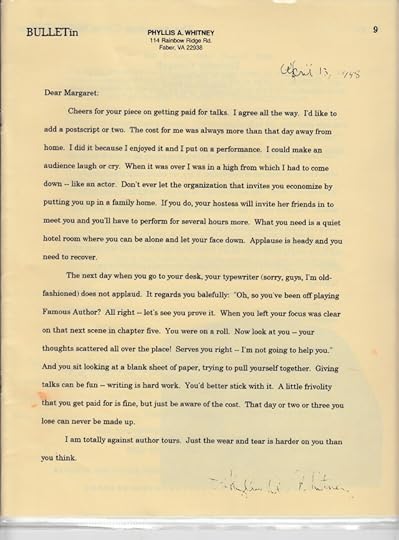
That sentiments in that letter, written in 1998, stand in stark contrast to the way writers today feel about what they must do to promote each new book. And they go a long way toward explaining why I feel the way I do about self-promotion. Once upon a time, it was the writer’s job to write and the publisher’s job to get the word out about the result. Of course, once upon a time, it was also possible for a mid-list writer to make a living by writing books.
Opinions are welcome, but please take the time to read the two letters that accompany this post before you comment.

Kathy Lynn Emerson/Kaitlyn Dunnett has had sixty-four books traditionally published and has self published others. She won the Agatha Award and was an Anthony and Macavity finalist for best mystery nonfiction of 2008 for How to Write Killer Historical Mysteries and was an Agatha Award finalist in 2015 in the best mystery short story category. In 2023 she won the Lea Wait Award for “excellence and achievement” from the Maine Writers and Publishers Alliance. She was the Malice Domestic Guest of Honor in 2014. She is currently working on creating new omnibus e-book editions of her backlist titles. Her website is www.KathyLynnEmerson.com.
Lea Wait's Blog
- Lea Wait's profile
- 509 followers



